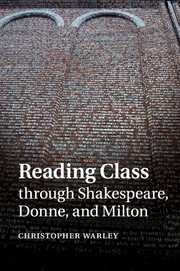
- Cited by 7
-
Cited byCrossref Citations
This Book has been cited by the following publications. This list is generated based on data provided by Crossref.
2017. John Donne and Baroque Allegory. p. 137.
2017. John Donne and Baroque Allegory. p. 94.
Kennedy, William J. 2018. A Companion to Renaissance Poetry. p. 570.
Béres Rogers, Kathleen 2019. Creating Romantic Obsession. p. 91.
Hanson, Elizabeth 2019. Staged Normality in Shakespeare's England. p. 69.
Lappin, Anthony John 2020. Baroquely valedicting: Donneforbidding mourning. Date, purpose, and repurposing. Studia Neophilologica, Vol. 92, Issue. 1, p. 1.
Rosenfeld, Colleen Ruth 2022. Do You Hear What I Hear?. Spenser Studies, Vol. 36, Issue. , p. 295.
- Publisher:
- Cambridge University Press
- Online publication date:
- January 2014
- Print publication year:
- 2014
- Online ISBN:
- 9781107281103




